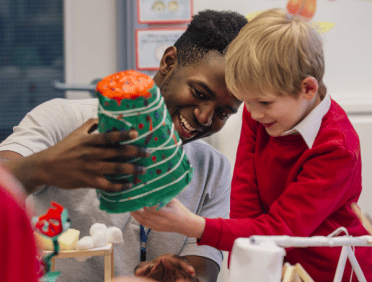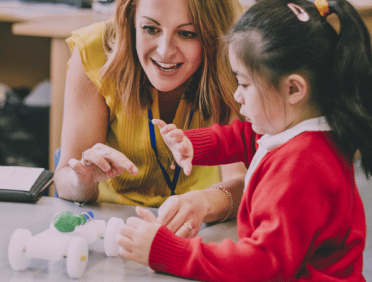When it comes to educating children and ensuring that they have the skills and knowledge they need for their future lives, many people play an important role.
Of course, you may instantly think of teachers as one of those key people, and this is with good reason, as one of their responsibilities is to educate our children. However, many others have just as important a job to do when it comes to kids in school.
One example of this comes in the form of a teaching assistant. You may know what a teaching assistant is, but there is a good chance that you may not entirely understand what they do.
Not only this, but when children have a fully qualified teacher, why would they even need a teaching assistant in their classroom?
This article explains what a Teaching Assistant is, what their responsibilities are and what it means to take on this sometimes tricky, always hugely rewarding role.
The role of a teaching assistant, also referred to as support teachers or early years practitioners, is to support pupils in either a classroom or nursery setting. Teaching assistants are there to ensure that the needs of children are met, not only when it comes to their education, but also in their emotional and social development too.
This work could be completed with children individually, in a group, or even by offering support to the entire class. It can be under the guidance of the teacher, but largely a teaching assistant will be given fairly general instructions and it will be down to the teaching assistant themselves to come up with the best ways to provide this much needed support.
As well as focusing on the children and what they need, a teaching assistant (TA) also needs to take on any additional duties given to them by the teachers that they are supporting. The main aim of the teacher delegating certain tasks allows the teacher to focus on their main role (teaching).
Some of the jobs that teaching assistants do include preparing the classroom for any lessons, making up resource packs based on guidelines from the teacher and creating displays of the children’s work.
The TA role is different depending, of course, on the school they work in. This means that if a TA moves schools, they may find that the rules of what is expected within the job role may change from what they were at the previous school.
Another way that TA roles differ is that they have a variety of roles that they can take on. Some TAs work with the classroom as a whole, while other TAs have set tasks within a school and move from class to class when needed. Some TAs may just work exclusively with one pupil, usually due to special educational needs.
What does a teaching assistant do?
We have looked at what a TA may need to do as a whole in the classroom, but you can drill down into this in more detail. In fact, being a TA can often mean that you never have two days that are the same!
A TA’s main responsibilities will depend on the experience they have, their status within the school (whether they are a higher level TA) and what training they have had.
TAs often have the responsibility to:
- Support children to ensure that they are engaged in their learning and that they remain focussed on their task whilst they are working
- Support the social and emotional needs of each child and ensure that any issues that they pick up on are reported
- Offer support to the teacher when faced with challenging behaviour and help to ensure that positive behaviour is promoted
- Listen to pupils read, as well as reading to the class
- Monitor the progress of key students and report back to the teacher
- Carry out and complete any administrative duties that need to be done within the classroom
- Administer first aid and also help children who have had accidents or who require assistance getting dressed
- Offer support throughout the school where needed. This could be covering for the absence of other TAs, going out on school trips and helping out during exams
- Running and working on extracurricular activities that relate to the school. This could include breakfast and after-school clubs
- If you are a higher-level teaching assistant, you may have to take on additional duties due to your experience.
These can include:
- Delivering tailored teaching activities to pupils. This could be to a small group or on a one-to-one basis
- Leading class activities following the directions given by a teacher
- Taking classes alone, during teachers’ planning and marking time
- Helping the teacher to plan any lessons
- Supervising other support staff
- Coordinating key areas of teaching support
As your knowledge and experience of being a TA grow, you may take on a particular specialist area. For some, this could be literacy, for others numeracy. Others may find that they work with Special Education Need (SEN) children, autistic children, deaf children or those who do not have English as their first language.
Whilst training can really help a TA to be able to find their niche part of the role. More often than not a TA will simply learn on the go. They will discover what they enjoy doing and what they feel most comfortable doing and then they can bring this into the classroom and the children that they work with.
Why is the teaching assistant role important?
It is not always easy being a teaching assistant; however, it is a job that is hugely rewarding to do. Teaching assistants are an essential part of every school setting.
Teaching assistants are there to provide a vital role when it comes to educating students. Teachers are there to educate children and ensure that they have all the knowledge and learning that they need to get through school, but it is the support that they get from their teaching assistant that will make the difference.
Classes are often quite large, and large groups can be difficult to manage. Teaching assistants will support teachers, which will allows children to get the maximum help and benefit whilst they are trying to learn. Teachers will plan out the best activities for the class, and then the teaching assistants will be there to allow for these to be carried out.
Another reason that teaching assistants are essential is that they can ensure that the classroom setting is happy and nurturing even when a large number of children and high stress environment can make it feel otherwise.
Whilst helping with the education and emotional needs of the children in class is an essential part of working as a teaching assistant, there are many other important things that teaching assistants do within the school setting.
They are there to ensure that the classrooms and the schools offer the right environment for children to learn. The school should be neat, clean and fresh. This ensures that the children are safe and secure and makes sure that essential resources are available when they are needed.
Classrooms should always be a place where children feel that it is okay to be curious and discover more about the world around them. Whilst this is something that a teacher can encourage, teaching assistants can also take this one step further and ensure that children feel that they want to explore the resources that are available to them and take charge of their own learning in some ways.
A teaching assistant will ensure that any teaching equipment and materials are put away at the end of a busy day and stored in a way that keeps them neat and easy to access when needed.
Another reason that teaching assistants are essential is that they are there to pick up on issues that teachers might not have the time to notice. This is not because they don’t care about the children in their class, but due to the number of children they are responsible for and the work they have to carry out already. It can be hard to know what is happening with every single individual child. They can then report back to the teacher on children and discuss what needs to happen to move the learning support, or the emotional support, of that child forward.
Whatever way you look at it, being a teaching assistant is a hugely rewarding job. It might not be the highest-paid role in the world, but it will make you feel that you have achieved great things at the end of every week and every day.
If you think that you want to make a difference in a child’s life and ensure that they have the best start in their school life, then become a teaching assistant and learn what it takes to give your all to the role.
There are a huge variety of teaching assistant jobs that you can apply for, and if you want to learn more about what it takes to be a teaching assistant; then there are teaching assistant courses online that you can take to study the key skills and knowledge that will help you to be the best TA possible.
At Learn Q, we offer two different TA qualifications that are ideal to help you star, or progress, your TA career. The Level 2 Award in Supporting Teaching and Learning in Schools is designed for who want to do a teaching assistant course without needing experience or who are looking for a teaching assistant course without needing a placement, while the Level 2 Certificate in Supporting Teaching and Learning in Schools is better for those who either already have, or will soon have, a placement in a school. If you are not sure if a full qualification is for you, you can also access the full course (without any assessment of learning) here at a reduced price. All of these courses can be taken by those who want to become a teaching assistant without existing qualifications.
Whatever route you choose, becoming a teaching assistant, or support teacher, is a richly rewarding and highly valuable career which gives the rare opportunity to help future generations succeed.
To download a .pdf of this blog, please click here












